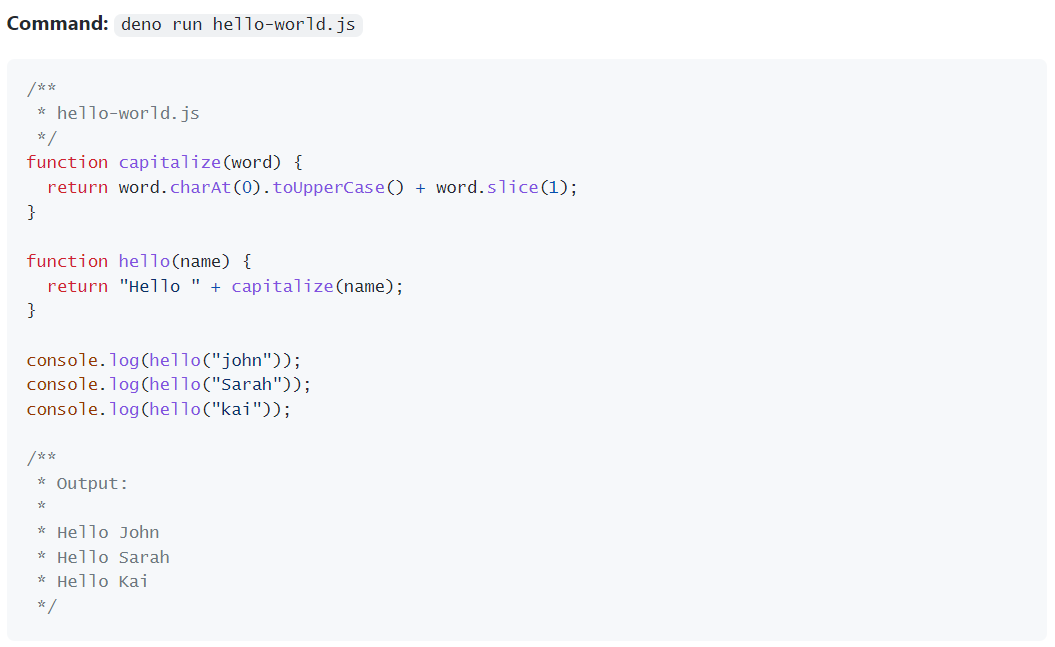Introduction
There is no argument in saying that Node.js is the world’s most popular and widely used JavaScript runtime environment. But, the arrival of Deno in 2018 created a big hype, and developers can now access a more secure framework with modern features.
Deno is introduced by the same author (Ryan Dahl) as Node.js. It's dubbed as its successor, here to fix some of the major design pitfalls in Node.js. Although, the announcement of Deno sparked a lot of speculation about whether or not Deno is replacing Node.js. So far, there haven't been any significant changes. Most developers remain satisfied with Node.js.
In this article, I'll try to explain why the adoption of Deno has become very slow, and why, people still prefer Node.js. I'll then attempt a comparison between Node.js and Deno.
What is Node.js?
Node.js is a prevalent server-side, open-source, cross-platform JavaScript runtime environment built on Google’s V8 JS engine. It's been dominating the web development world since 2009.
Node mainly focuses on event-driven HTTP servers. When it comes to handling requests, it runs a single-threaded event loop registered with the system, and each incoming request triggers a JavaScript callback function. The callback functions are capable of handling requests using non-blocking I/O calls.
Additionally, it can distribute the load among CPU cores by spawning threads from a pool to carry out blocking or CPU-intensive tasks. Unlike most rival frameworks that scale via threads, Node’s callback function-based scaling mechanism can accommodate more requests with minimal memory usage.
Node.js is lightweight and ideal for scalable, data-intensive, real-time web applications that can run on distributed devices thanks to its asynchronous I/O and event-driven architecture.
What is Deno?

As previously mentioned, Deno is a new JavaScript framework that seeks to address Node’s design shortcomings and provide a modern development environment. According to Dahl, the creator of both runtimes, Node.js has three significant drawbacks.:
A poorly designed module system that
relies on centralized distribution.
Unstable legacy APIs.
Lack of security.
Deno supposedly fixes all three problems and provides a better experience.
Deno is a JavaScript, TypeScript, and WebAssembly runtime with secure defaults and no file, network, or environment access unless explicitly enabled. It’s built on V8 JS Engine, Rust, and Tokio. Deno adopts web platform standards, it's always distributed with a single executable file and has built-in development tooling to provide a productive, secure runtime. It has a set of reviewed (audited) standard modules that are ensured to function properly during the Deno runtime. Deno also supports native TypeScript file execution without the need for further configurations.
Related content for your soul and skill:
TypeScript vs JavaScript? Is TypeScript a better JavaScript?
The best JavaScript frameworks for frontend developers
7 ways ChatGPT can help developers
Deno vs. Node: Main Differences
Now, let’s look at a head-to-head comparison between Node and Deno.
Third-party package management
With Deno, developers can install packages straight from URLs without having a centralized registry like npm. Despite the risk of downloading packages directly from and URL -for example, if the server hosting the package is compromised, an attacker could modify the code to include malicious functionality- Deno offers a way to mitigate this by caching downloaded modules. Packages can be directly imported into the script as a library. By allowing scripts to run from any public URL, Deno eliminates the necessity for a package manager to import the modules. However, there is still a risk in importing modules from a third party. Package.json file and node_modules file is also removed.
In contrast, Node.js uses npm to handle all packages. It also has a vast ecosystem of libraries and packages.
Deno’s module import mechanism is more flexible than Node’s, allowing you to import code from anywhere, including GitHub and any CDN or registry you host. This enables seamless module imports without the need for downloading or installing.
APIs
Node.js was created before the concept of Promises, or async/await, was introduced in JavaScript. Hence, most APIs were designed to accept an error-first callback. This method frequently created wordy and complex code. Now that Node developers have access to this async/await syntax, they must also manage backward compatibility because APIs change frequently and are unstable.
In Deno, this is entirely different. There is no requirement to encapsulate in an async function since it already uses await and supports the latest JavaScript features. So, Deno facilitates binding future-based APIs into JavaScript promises by simplifying this process for developers. Deno is also intended to be compatible with the web platform APIs used by JavaScript code running in browsers. A number of the most popular advanced web APIs, such as Fetch, Web Storage, Web Workers, and Broadcast Channel are supported in a way that meets standards.
Security
Security was one of the main reasons Ryan Dahl created Deno.
Deno executes all the code in a secure sandbox environment that forbids access to the file system. Deno first asks for authorization before accessing the file system.
To get permission, you'd need to get it via a command-line argument that would prevent any file from being removed without the developer’s consent. Several command line flags in Deno can be used at runtime to enable particular functionalities for particular scripts. These functionalities are inactive by default; you must explicitly set a flag for any elements your script might require.
These flags consist of:
— allow-envAllow environment access for things like getting and setting environment variables.
— allow-hrtimeAllow high-resolution time measurement.
— allow-netAllow network access.
— allow-readAllow file system read access.
— allow-runAllow running subprocesses.
— allow-writeAllow file system write access.
Node.js was never supposed to be a highly secure framework. For example, Node doesn't require granting access to read or write to the file system and it's not sandboxed. So, any third-party library can cause trouble with a little bit of negligence. Also, there are standard security measures that guard against threats like cross-site request forgery (CSRF) and cross-site scripting (XSS) advantageous to Node users. These mechanisms involve checking the logs, correctly managing errors and exceptions, and verifying user input.
So, despite getting used to the security module’s strictness, Deno is the best option for a more secure environment.
TypeScript Support
TypeScript is a superset of JavaScript that enables users to add optional static typing. Deno supports TypeScript out of the box by utilizing a TypeScript compiler with a caching technique. As a result, Deno can compile, type-check, and execute your code without translating it to JavaScript.
Although Node.js lacks inherent TypeScript support like Deno, TypeScript is a well-known and widespread language in the Node.js community thanks to the TypeScript package. As a result, TypeScript and Node can function along quickly with minimal effort. If you already have Node and npm installed, you just have to run npm install -g typescript to install TypeScript on your machine globally. Next, run tsc --init to create a TypeScript configuration file. The TypeScript compiler tsc can then be used to compile your .ts files.
Deno is the appropriate framework if you like TypeScript and prefer to try out a novel framework. Also, developing with TypeScript in Deno doesn’t require any extra configurations.
Why developers choose Node over Deno?
In everything we’ve covered so far, it’s obvious that Deno provides some special features for developers, such as a strong support system and native TypeScript compatibility. The design strategies and other built-in tools are made with the intention of giving developers a productive runtime environment and a positive experience.
So, why hasn't Deno replaced Node already? As we can see, the adoption of Deno over Node.js is really slow. There are many reasons developers still prefer using Node.js, despite having a new modern framework that addresses many of its design problems.
When Node.js was originally released, a few of us began using it and were utilizing it in live applications. Over the years, Node has changed a lot in order to meet the needs of the software development community. It is now the most widely used JavaScript runtime. Because of its widespread use, you can access a top-notch community of skilled developers. Built on npm, the Node.js package system is extensive and simple to handle. Therefore, when flexibility and familiarity are your main concerns, Node.js is the best option.
However, Node hasn't achieved perfection. Far from it actually. Deno makes advancements in various important fields Node is still behind, especially when it comes to security and standard compliance. Deno’s single binary pattern makes it more portable than Node, and the open-ended module architecture may be established as the future norm for dependency imports.
What's keeping developers from shifting to Deno?
Although Deno’s community is active, it's still quite small. Deno-specific packages are quite rare, and the Node compatibility layer isn’t always reliable. If you wish to use a certain library, or if you require assistance, this could put you at a disadvantage.
One clear area where Deno falls short is the lack of third-party packages, as well as the fact that, given its immaturity, it hasn’t undergone as much real-world use as Node. On the other hand, Node.js is quite modular. Many libraries can be found in one location thanks to the Node Package Manager (npm). Its popularity is mostly due to the fact that you can update your work by downloading countless numbers of packages.
Additionally, many of the features that Deno offers can be achieved in Node.js with the aid of third-party libraries. Therefore, if there are only a few aspects of Deno that you like, you can probably accomplish the same thing with Node.js, though not as smoothly as with Deno.
The simplicity of working with permissions in Node is an additional crucial feature. You can quickly receive feedback on the platform without having to go through a variety of authorizations. Node.js requires minimal effort for quick coding because it rarely requests specific permissions. As a result, it's ideal for all sorts of dynamic projects that demand regular updates and a large team of experts.
Therefore, taking these factors into account, I’d say that most developers are happy with the direction Node.js is taking and aren't likely to make any changes any time soon.
Compared to the large and thriving Node.js community -a community worthy of further exploration- Deno is still in the 'learning how to walk' stage. It hasn’t yet been thoroughly tested in real-world systems of production and developers are still adjusting to this new runtime environment. Surely, it has enormous promise because it solves important Node drawbacks, including security, modules, callbacks, and the central distribution system. For the time being, Deno is mostly interesting to early adopters as a novelty. Gradually, the community supporting Deno should be able to make it a necessity for web development.
The Creator of C++ reveals what lured him into programming
Conclusion
After comparing key features of Deno vs. Node.js, I hope you can now see Deno's potential and understand why developers are slow to adopt it. Deno will undoubtedly continue to attract more and more attention and has (in my opinion) a very promising future.
But as a software developer who needs to get things done, you're the one who knows what best suits your needs.
Thanks for reading!



